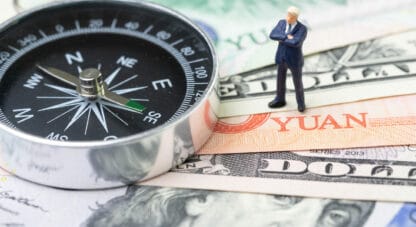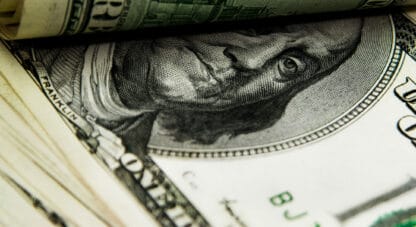About this week’s show:
- 100 years since “The War to End All Wars.”
- Mexican junk bonds...the new T-Bill…Really?
- Putin confidant: ”There is war coming in Europe.”
The McAlvany Weekly Commentary
With David McAlvany and Kevin Orrick
Kevin: It’s been a year of anniversaries. Last week we talked about the 70th anniversary of the Bretton Woods agreement, but this week we mark the 100th year anniversary of the beginning of the war to end all wars.
David: With 100 years in the rear-view mirror, we can say that with World War II, with Korea, with Vietnam, with various Middle Eastern incursions, Iraq I, and Iraq II, it was really the war to redefine all wars, not the war to end all wars.
Kevin: Yeah, it did not end it, did it?
David: No, in fact, what we’ve seen is the mass killing with weapons that have, over the course of time, created a distance from the consequences of policy choices, and even the choices that a soldier makes, played out on a battlefield. We are evolving, but the progress that we are making is really tied to technology, an advantage warfare which has led to dehumanized choice. We have battlefield statistics; they give us the improved score. And yes, this is sort of a mechanized warfare which has morphed into almost war games. The real thing is played, but it’s played almost X-Box style, or like you’re playing a Wii-2 game, a tussle amongst friends on the same block, not realizing that there are other people at the end of these joysticks.
Kevin: You know, Dave, it makes me wonder, too, just how vulnerable we are. Just before I came into work this morning I was looking at my new Air and Space magazine. It was talking about the New Orion space capsule. They showed the difference between the cockpit of the old Apollo capsule and the new Orion capsule, and it was amazing. You look at these chairs as they are sitting back, and instead of having the normal gauges, dials and buttons that they pushed during the Apollo era that were very mechanical, by the way, instead they had just three computer screens for everything. I was thinking, “Gosh, what would Apollo 13 look like – when they were having to put things together with duct tape and everything else – what would Apollo 13 look like with this new technology? That’s how war is fought right now, too. It’s all just screens. As you said, these are guys sometimes that are sitting somewhere in California playing a video game, flying a drone over Yemen, or Ukraine, or you name it.
David: I think the interesting thing is that that technological advantage can go away under the right circumstances, or I should say, under the wrong circumstances. So, what makes us the leader of the military world could be compromised very quickly in terms of that dependence on technology. Think about what happens when you take your car to the shop. It used to be that you could tinker, and maybe it was flush out the carburetor or change the spark plugs, maybe it was this or that to sort of fine tune your vehicle. Now, fine-tuning your vehicle is taking it to a specialist who hooks it up to a diagnostic computer. They run a fair number of algorithms through the machine to figure out what’s wrong or what’s right, what needs to be fine-tuned. And then, and only then, can they get to work, because nothing is that obvious any more, everything is very technology dependent.
Kevin: I think we should talk later in the program just about what our vulnerability is, because we do feel the drums of war starting up, in Ukraine, we see it in the Middle East. But let’s cover the financial right now while we’re talking, because false senses of security are being threatened right now in something that has always just been a bedrock, you never break the buck, we’re talking about money market funds.
David: Sure. Last week we talked about money market funds facing the music. We talked about 35% of all money market funds being treated differently. After what occurred, scheduled for last Wednesday, the SEC hearings were heard, and they did come up with two things. I would love to sit down with bank regulators and know their view. Does this benefit them in any way? Does this shift assets out of money market funds into bank deposits, or instead, is this really the SEC battening down the hatches in order to preserve the industry organizers, frankly, at the expense of the public – John Q Public who is putting money into a mutual fund, and now at the end of last Wednesday, these are the conclusions they came to: Number one, under stress and strain in the marketplace, you will be faced with an exit fee from your money market mutual funds.
Kevin: So, you’ll be charged to take your own money out of a money market fund.
David: And number two, an alternative would be that there is as much as a ten-day delay on any redemption from a money market mutual fund.
Kevin: And think about a time of stress, Dave. How much can happen in ten days? Look at the Weimar Republic? How much did the mark devalue in a ten-day period? It could go from 100% down to about 2% in that time period.
David: You remember the safety checks that were being done at Chernobyl. Literally, in order to improve the system, they were coming in and tinkering with things at Chernobyl, and it was the safety checks, which in a complex system ended up triggering a major catastrophe of a meltdown of a nuclear reactor. I think they are well intentioned, and the SEC is trying to coordinate things, but in a very complex financial system, it doesn’t take that much tinkering, in fact, to create major issues down the line.
Kevin: So, the person who would use a money market instead of a bank, which many of our clients do, we have recommended that in the past, they may now turn more toward the banking system.
David: Well, and frankly, I think it may be a push on the part of the Treasury to re-enfranchise treasury ownership. Money market mutual funds that have treasuries only won’t have those same restrictions, limitations, or penalties, and so there may be growing popularity for treasuries in the money market space, with some allowance for extra leverage and extra risk-taking just so that those mutual fund companies can make a buck at the same time.
Kevin: Dave, do you think they are preparing for something? The IMF has come back out and said, “Look, we were going to have slow growth as it was; we said it was going to be 2%. Now we’re revising our estimate and saying it’s only going to be 1.7%. Now, that can’t be weather, can it?
David: No. Well, exactly. We only wish it was snow flurries as a possible explanation for why growth is slowing for the full year outlook. No, the IMF downgraded us to 1.7% in July, they had already downgraded us in June to 2%, and I guess the one thing you could say is, if you are lowering expectations it may set us up for a whopper of a surprise. You see that oftentimes with Wall Street. They will lower forward guidance, and then beat that forward guidance by a penny, and everybody says, “Look at how well they’ve done.” Lower forward guidance by a dime, then beat by a penny, and you’re the winner. To some degree, if you lower it to 1.7 and come in at 1.8, you’re the hero.
Kevin: It reminds me of the kid who says, “I think I’m going to fail this class, Mom and Dad,” and then he comes back and he says, “Hey, I got a C!”
David: “Oh, you didn’t fail? Fantastic!” Well, at the same time you have junk bond outflows, which, in the last few weeks have been taking prices down and yields are starting to move up, and this is really a reversal of investment flows which was fairly predictable. We’re still surprised to see, in the general marketplace, a lack of risk aversion, and we saw this acutely this last week. This is just shocking to me. Yields on junk-rated corporate debt, in Mexico – it’s junk, first category of concern. Second category of concern – now you have, not only your regular credit risk, but also your interest rate risk, and now layered on top of that you have currency risk.
Kevin: Well, let me guess. That’s got to be paying 15% or 20%.
David: Junk paper should pay 15% in Mexico, and U.S. junk paper should pay 10-12%. The fact that Mexican junk bonds are paying less than 5.5%, right around 5.23%, tells you just how skewed these markets are. And then you have Spanish ten-year treasuries. They dipped below 2.5% for the first time in two centuries – in two centuries. As we sort of grow numb to what is happening in the marketplace around us, as we get used to a new normal, keep in mind that these are things that haven’t happened, either in decades, or in this case, in the Spanish treasury market, in two centuries. I think to myself, “This is absolute insanity.” In the first half of the year, you have emerging markets and frontier markets – these are your sort of micro caps, if you will – very small countries. They’ve issued a record amount of debt. It is up 54% from 2013, according to the Financial Times. And that does not include China, by the way. All of this is on the belief that central bankers are the new gods amongst men.
Kevin: Even Bloomberg is talking about it. Bloomberg is not necessarily the thing you think of when you are thinking about crying wolf. Bloomberg is coming out and saying, “You know, people may be looking a little too much toward these central banks to bail everything out.” It’s the certainty that we talked about over the last several weeks.
David: And then you know what’s funny is you’ll have some other news pundit come on and say, “Yes, but the fact that we’re asking the question about a potential problem here really underscores the fact that we have no problem at all, because the problems that are the real problems are the problems that we don’t see coming, and the fact that you saw it means that this isn’t a problem – at all.” It’s this back and forth of justification for high valuations. In my life, and in my world of investing, I’ve found the greatest satisfaction, really in life, coming from lowering expectations. The marketplace, on the other hand, doesn’t seem to mind the gyrations of setting expectations extraordinarily high, and then seeing, frankly, market prices collapse when disappointment occurs, and what you would hope doesn’t come to fruition.
Kevin: Well, we can still measure real business, though, Dave, when you’re making something, going out and actually tilling a field, or dragging something into a construction zone. Caterpillar just keeps losing money.
David: I prefer to count value in terms of Facebook likes, because frankly, I feel more valuable at the end of my 500th Facebook like than I do looking at Caterpillar’s numbers. Seriously, Caterpillar reports 19 consecutive months of declining year-on-year sales. This is ridiculous.
Kevin: What do you think is causing that, though? One of their main customers, I think, has been an Asian customer, as China has been rebuilding their infrastructure, or building, for the first time, their infrastructure. They’ve been buying a lot of equipment.
David: They’ve been buying equipment, but it is also the countries that are in the process of getting materials to China that need heavy earth moving equipment and what-not. So, yes, there is a shift in the model of growth from investment there in China, and infrastructure growth, to the new model of consumption growth, and that metric has begun to grow – not significantly, but it went from 35-36% of the economy. And again, that’s consumption. But it’s not moving, to a huge degree. You have to roll the clock back to, say, 10-15 years ago, and they actually were at 45% of the economy was consumption, and then it slips to the low 30s.
Kevin: Can I ask you a question, though? Because, isn’t this something from a Chinese perspective? We’ve talked to Pettis, we’ve talked to some of these guys who are ex-pats, and these guys said for China to actually grow they’re going to have to move away from that investment side of things and grow toward more of a consumption type of economy like America did.
David: Sure. And you’ll see that impact, certain natural resources negatively, and certain natural resources very positively. When you look at Brazil, when you look at Chile, when you look at Australia, you have products that are used for building materials, commodities needed for the development of infrastructure, and those products aren’t going to be in demand as much. Meanwhile, you have consumables, which will continue to increase. Folks in New Zealand are saying, “This is like white gold.” They’ve got herds on every field, and the fact that milk is flowing and being exported to China, there is where agricultural commodities are diverging from industrial commodities. At the same time there is this minor shift from the investment and infrastructure development toward consumption in China.
Kevin: As we look here in America, we were talking about Caterpillar, but one of the great ways of seeing whether we are actually recovering is new home sales, and something is fishy right now in the numbers on new home sales.
David: Sure. Well, we’ve looked at existing home sales before. Last week we had June’s new home sales, which tumbled 8.1%, and the really interesting details in the report were that they revised the May numbers down. They also revised April down. They also revised March down. And I struggle with that because it turns out that new home sales statistics don’t actually count new homes sold. When you are revising back on a new home sales figure to May, April, March, and 86,000 home that were sold are now unsold? What does that mean, exactly? Are these transactions that weren’t completed? They were pending, and counted, and never went through? Or in fact, are we talking about sort of a statistical model, an aberration where, yeah, well, we thought we were going to sell 86,000 on the basis of a particular run rate, or this particular methodology, but I think to myself, “Pravda would choke on our current methodologies.” You know, the old Russian news agency known so well for propaganda. How do you erase 86,000 homes sold?
Kevin: You’re talking about propaganda. I had brought up Bloomberg before, and we don’t have anything, necessarily, against Bloomberg, but there is a propagandized message in Bloomberg. Let’s look at the Marc Faber interview.
David: CNBC, Steve Liesman. I was on with him on the Early Morning Show, and we actually nearly got into fisticuffs. Do you remember that interview?
Kevin: I do. I do.
David: “Oh, you think people should own gold?” It was like, “I’ve never met a moron quite as idiotic as you!” It’s that same sentiment. It doesn’t matter if it’s Bloomberg or CNBC. Marc was adamant, looking back and talking to the viewer this last week, and talking to the interviewer, that in December and January in his published newsletter he had talked about gold being undervalued, and gold shares being undervalued, and they should be acquired, much more attractive than U.S. equities. And lo and behold, year-to-date, U.S. equities are up 6-7%, but gold shares are up 20-30-50%, depending on the quality of the issue, and gold is up 10%. So, he was right, he was right. But that’s from the beginning of the year. And I think what was curious was the host’s antagonism and sort of repeated circling back around to gold’s underperformance over the last two-and-a-half years, regardless of the year-to-date Dow performance. Her point was that on a longer timeframe, it was a terrible investment. And I listened to this interview, and I’m sitting there, almost jumping out of my skin. I wanted to jump onto the screen and ask, “Why the last three years were the only years that mattered.” And just bear with me, set aside that this has been an inconvenient time for anyone who purchased gold in that timeframe, the last 2-1/2 to 3 years have been ugly. But the bull market began in 2000 and has, in spite of a nasty correction, remained multiples ahead of equities.
Kevin: I think we should do that. Let’s look back to the start of the bull market, March of 2000. Let’s just compare stocks to gold.
David: You have equities, which take the S&P 500, a broad measure, it has actually outperformed the Dow, so we’ll be generous and use the S&P; you have returned roughly 70%. So, if you were taking $1000, it’s now $1700, that’s a 70% return.
Kevin: That’s going back to 2000.
David: 14½ years, puts you at about 4.8% per year, in nominal terms. Now you have to factor in inflation. Just using the CPI, inflation-adjusted terms, you’re up about 1.48, but let’s just call it 1.5% and be generous.
Kevin: And that’s annual, 1.5% a year, going back to the year 2000, if you were in the S&P 500.
David: That’s correct, 1.5%, or nominal returns, 4.8%, to get you to that 70%, over the course of 14-1/2 years. Gold, over the same timeframe, you took your $1000 investment, it bought you roughly 3-1/2 ounces of gold at the time, and today, your 3-1/2 ounces of gold are worth right around $4600; silver, roughly the same, from $1000 to $4600 versus $1000 to $1700, and there is this sort of constant drone of, it’s a ridiculous investment, nobody wants it, roughly 32% per year in nominal terms is not interesting, according to CNBC and Bloomberg. And by the way, that’s off of a peak, because if you wanted to factor in $1900, I’d have to do the math. $1900 and 3-1/2 ounces would be closer to $6700. So, it just confounds me.
Kevin: Well, even if you take the inflation out, like you did with the stocks. Let’s take 3% or 3-1/2% CPI out, you’re still at almost 28-29% return per year since 2000.
David: No, let’s do this. Let’s say we take real world inflation and not the CPI inflation rate. So, let’s give them CPI, and we’ll take full-bore 8-10% annual rates of inflation. Let’s just say that it only returned 15% a year, as opposed to the 1.5% inflation-adjusted. CPI inflation for them, real world for us: 1-1/2% for them, 15% plus for us. Again, it confounds me the way Bloomberg or others can want to overlook the tremendous move in price already witnessed.
Kevin: And this confirms why they are always late to the party. They are going to miss the last portion of this precious metals bull market, aren’t they?
David: I think they will. We’ve been in a transition. Equities, in our view, in a long-term structural bear market, with a short-term cyclical bull market still in play, as we speak, precious metals on the other hand, they are in a long-term structural bull market, a growing market, and they are completing, or have completed, the cyclical bear phase, about 2-1/2 years of declining and sideways moving prices.
Kevin: Let’s go back and define that. There are secular and cyclical; sometimes it goes past us quicker than we can actually define, but give an analogy as to what a cyclical or a secular market would do.
David: Charles Dow said of secular versus cyclical trends, that secular trends are like the tide; it goes in and it comes out. And the cyclical trends are more like a set of waves hitting the beach. So these are obviously relevant, but in terms of the power and force in the market, the natural force of the tides is more significant than the activity of the waves, even the waves taken in aggregate. So, his advice complements ours. This is Charles Dow, who started the Dow Jones Industrial Average, Dow Jones Transportation Average. He was the original editor of the Wall Street Journal. Capture as much of any long-term secular trend as you can, which frankly, is better achieved, it is more easily achieved, when you take on the mindset of an endowment.
Kevin: An endowment – you’re thinking long term, even intergenerational.
David: Exactly, where you’re looking at time as a friend, instead of an enemy; you’re not marching up against it. But if you have an investment deadline, where you are managing results for a calendar event, what you may miss is the full expression of a secular trend as you attempt to conform the markets to your expectations instead of the other way around.
Kevin: David, I think of so many people who have watched their friends over the last year, two, or three, start to make money in the stock market, and down deep inside they know it’s dangerous, they know that secularly, we may still be in a bear market, but they just can’t help themselves. They will sell gold, or take some of the cash and go into the stock market. Usually that is right before the market comes right back down, because it is one of those short-term waves.
David: Yes, and I think of the number of investors I’ve spoken to that have retirement assets that target a specific date for retirement, a mutual fund that targets 2035, and the allocation of stocks and bonds is going to get you ready for your retirement date, launching into the golden years at 2035 or 2025, or 2020, or whatever the date is, and that allocation, those funds, essentially, shift from stocks to bonds to meet the generic criteria of lowering your risk as you approach the time frame where income will arguably be more important than growth. Listen, there is a part of me that says, “Okay, I understand the practical side of that, I understand from a planning point of view that that works.” But that’s the practical side. The practicable side – does it actually work? It doesn’t. Markets will rarely, if ever, do what you want them to do when you want them to do it.
Kevin: I think this is a critical point, because I have seen this so often, where a person is told they can be in stocks until they reach their 50s, 60s, 70s, and then they start moving to bonds. The problem is, the interest rate cycle, the secular cycle, may be wrong. That reminds me of when the tide goes out. When you are near an ocean and the tide goes out and you go in and say, “You know, let’s camp at the beach. Let’s go ahead and set the tent up. If it’s low tide, you set that tent up, and you’ve got a surprise when high tide comes back in. And it’s the same type of thing if the secular market does not match your retirement market, you are going to get wet.
David: That happened to me when I was 14 years old. We were down at Galveston. We had gotten there late at night, set up the tents, and the next morning we had six inches of water coming in. That’s so funny that you should say that – 14 years old, Galveston, the tide coming in, because we set up the tents in the wrong place at the wrong time.
Kevin: Let’s look at the two ways of looking at the market, because you’ve talked about endowment, but not all of us can look three, four, or five generations down the road. When we talked to Smithers he told you, “I’m probably old enough that I’m not going to make many more of these cycles, so he is having to alter his investment plans. But he said, if you were running an endowment for, let’s say, a college or an organization, you’re not going to make decisions based on today’s market moves.
David: No, and that doesn’t mean that you sort of philosophically say, “Well, I’ll just take the volatility as it comes.” That is the view held by many stockbrokers, which is that you buy stocks for the long run, downside volatility you ignore completely, and just know that stocks will always take care of you. Jeremy Siegel told you that it will give you 7% rates of return per year, and that’s what the statistics show. Granted, the last 14-1/2 years have upset that idea.
Kevin: So Dave, is there are a balance between the two, actually trading some of these waves, and also looking at the secular trend.
David: I think, before getting into those details, you come up with two dispositions that I think are very fruitful for long-term success. One is of market agnosticism, that is to say, it doesn’t matter what you own, whether it is stocks, or bonds, or gold, or commodities, or currencies; rather, you want to own the assets that you have purchased at discounts. I think anyone with some experience, with some gray hairs, in the market will tell you that you make money on the basis of buying low.
And secondly, there is the idea that we mentioned earlier. The endowment takes the longer view, that’s the longer timeframe. So, when they’re looking at asset management, they will accept a variety of risks, which, to them, are not particularly dangerous or detrimental when timeframes are pushed out. I’ll give you a for instance: Real estate, and other, call them illiquid, assets. They have an inherent risk of nonmarketability. Yet, when time is factored out so that short-term nonmarketability becomes irrelevant, they can say we want to own them, and we don’t have to weigh in that risk into our risk-adjusted returns.
Kevin: You have a friend who has many, many rental units, and he made sure that he was out of debt so that when the market turned down he didn’t have to sell. He was able to maintain his real estate properties through the ups and the downs.
David: That’s right. That is clearly another strategy, if you will, of keeping leverage to a minimum, or eliminating it altogether, if you are sensitive to the cycles within interest rates. But as you mention, Kevin, I’m not suggesting that we are all endowments, or that any of us have the resources of an endowment. What I’m suggesting is that compelling compound rates are achieved when value is a priority, and when time is not. For the family that thinks intergenerationally, with a timeframe of decades or generations, there is a radically altered and advantaged outcome, compared to the person in need, or the priority of a short-term return.
Let me give you an example. I know a number of families that have owned ranchland, have owned real estate properties, whether it is commercial properties, or what have you, and they’ve owned them for a long, long time. And these are, let’s say, acreage that you bought for $100, $200, $300 an acre, that today sells at $5000, $6000, $7000, or even $10,000 an acre. That’s what I’m talking about. The compound rate of return is compelling, because of the cost basis, and that was only achievable by being a multigenerational project. That did not happen overnight, and someone looking to flip a property and make 20% on their money is never going to see the thousands of percent return which come from taking an intergenerational, or again, more of an endowment approach.
Kevin: But there is money to be made as a speculator. You can’t deny, for the person who is sitting down and day-trading, what have you.
David: Let’s say you’ve got a Jessie Livermore. You’ve got the stock operator who, today, would be in the hedge fund industry, and yes, there are short-term successes that, unfortunately, are not really translatable into a model that you can duplicate. You can’t duplicate it and say, “Kids, here is what I want you to do.” Because honestly, you’re not going to find that many Stanley Druckenmillers, for instance. He ran Duquesne Capital in concert with the Quantum Fund. George Soros was one of the chief traders for the Quantum Fund through Duquesne Capital. You don’t find many Stanleys in a generation. So I doubt very seriously those kids who will replace him will take on the mantle of being a stock operator, a stock trader, the way he did so successfully.
Kevin: Dave, one thing I’ve observed, I’ve had several friends retire so that they could day trade, and I’ve also had several friends unretire when day trading didn’t work in the long run. It’s like what you are saying. You may have a model that works for a short period of time, and then you have what they call a flash crash, or you have a black swan event, or you have something like that. And so, really, when you are talking more of the take-time-out-of-the-equation-and-buy-value mentality, those types of things don’t affect you as much, do they?
David: Think of the Kennedy family. Their M.O. today is maintaining wealth, and they’ve tried to do that through multiple generations. Maintain as it gets dispersed throughout the next generation. The Kennedy family is something of a dynasty. But you know what? It’s very different than the generation that worked on Wall Street during the depression and made the fortune. Now they’re keeping it, and they’re doing their best to keep it, and it has its challenges. But they’re not making a fortune. They’re simply maintaining. There is no duplication possible when the success is based on an individual and a nonduplicatable strategy. The process of wealth building, intergenerationally, is, in fact, very possible when a value orientation and patience is applied. This relates well to the idea of transmitting the skills that you need from one generation to the next, in order to succeed in life. Of course, success is not just a moment in time, it’s all the moments strung together in a compelling narrative, and we’re not saying that success is merely an accumulation or a multiplication of financial resources. Success includes many more intangible values. But the long process is similar, whether you are talking about the multiplication of financial resources, or the development of character. Nothing is achieved in a day that can’t be undone in a day, and I think if you are looking at a greater achievement, or a greater establishment of resources, whether that is interpersonal, intellectual, or what have you, or physical wealth resources, you take a longer time frame and set a clear vision to achieve it.
Kevin: I really liked that analogy, Charles Dow’s, of the tide versus the actual short-term waves. Let’s take this to gold. We try to always talk about gold a few times a month. Gold is still in a secular growth bull market, even though we’ve had a correction over the last couple of years, is it not?
David: Yes. The growth trend, we should review the dominos that tend to fall in line that are commensurate with the secular growth trend for gold, because there are a number of complementing elements. Gold is an asset that is no other person’s liability. It is money, good anywhere in the world, which is to say it is a mere cash equivalent on any continent, and in any country. It is an asset that under normal times – under normal times – that is, a healthy market environment, gets marginalized and forgotten about. Look at the period from 1982 to 2000. That accurately demonstrates gold being marginalized.
When there are diminishing concerns and growth in the economy, the control that is provided to the owner of gold is less important. So, the reason for being marginalized – yes, you’ve got positive rates of return that can allay many of the fears, which in turn, diminish any real benefit from owning gold. A growth in demand for gold, as we’ve witnessed since the year 2000, is driven by individuals, it is driven by institutions, it is driven by banks, including central banks, which are concerned, for one reason or another, with either market instability, asset price volatility, or an increase in inflation. It can be some social or political dislocation, including international conflict, that would decrease the value of other assets, and therein, increase the merits of a liquid asset, like gold.
Kevin: So, when we are considering the broader context of gold and silver, we have to look at a lot of different reasons why people would own gold. I think of the triangle, though, Dave. When we talk about the triangular investment strategy, there is one-third that is always a foundation in gold and silver, because you can’t necessarily time the tides perfectly. You don’t know when things are going to happen. But what you are talking about now is the growth in gold and the future reallocation, or exit strategy, out of excess gold, correct?
David: To some degree, but I think also, when you look at the context which has been supportive to the rise in gold and silver, over the last 10-15 years we see multiple stock market bubbles, we see the bursting of those bubbles, we see the inflation and deflation of a housing bubble, along with a return of international conflict, with the regional flashpoints being the Middle East, and those between West and East being highlighted by growing competition between the U.S. and China. Now we have growing conflict between Russia and the West for dominance in the sphere of energy. Is what is really happening in Ukraine with Russia an expression of Western interests in energy and Russia’s interest in controlling that energy market, and those interests being in conflict? These are circumstances which have been, to a degree, predictable. If you could roll the clock back to seven years ago when we started doing our weekly commentary, we suggested that financial crises – and this was before the financial crisis, by the way – lead to economic crises, which in turn create political crises, and these political crises tend to trigger geopolitical crises. This same process of devolution can work in reverse. And in reverse, what is it? It is the positive evolution in those same social spheres where geopolitical conflicts are resolved, international cooperation improves, domestic and political concerns come off the boil, so to say, and economic growth, ultimately, complements the expansion of finance and investment.
Kevin: I think a perfect example of that, Dave, is what we talked about with World War II, when we went from a geopolitical, huge conflict, and then we started to see it work backward. From the late 1940s until, really, the Johnson administration, we saw some of the best economic growth of the century, so what we had, actually, Dave, was a healthy evolution, where we went from geopolitical crisis and backed up through the political, and then to the economic, and then the financial.
David: As the problems were solved.
Kevin: As the problems were solved.
David: That’s correct. That was the great bull market of 1949 to 1967-1968, what we typically think of as a business growth cycle. So, in the current context, gold has responded to the last 14 years of devolution in the marketplace of ideas, and in the literal marketplace. That trend will continue for months or years to come until resolution to those concerns has adequately muted the desire on the part of institutions and individuals to own an asset that they can control, versus other asset choices which are owned through multiple intermediaries, where they don’t have as much control.
Kevin: In speaking about war and geopolitical crisis, Russia is really highlighting just how fragile the system is. TIME magazine, on the cover, is now saying that we’re in a new Cold War.
David: It does highlight the fragility of the post-Cold War piece. The U.S. is, at the same time, not helping anything. We’re demonstrating a brazen foreign policy. Listen, we ousted the Ukrainian president – our state department and CIA – and we placed a man who was less supportive of Russia and more supportive of the U.S. in his place. And not 90 days from those changes, we have Joe Biden’s son, who was brought on as a board member to the largest Ukrainian gas company?
Kevin: That sort of smells, doesn’t it?
David: You don’t think this looks like an amateurish adventurism from the Russian side? Could we state our energy interests in a less obvious way? This is where when I think of our foreign policy, it is brazen. Either that, or our diplomats are not aware of just how dirty politics is today, and how much politicians today are pimping their rolodexes and gaining a family and wealth advantage through the connections that they have politically.
Kevin: A regular guest that we have on our commentary here, Dr. George Friedman, from STRATFOR, told us five years ago that Russia would have to retake that barrier, because Russia’s only defense, going back to Napoleon, going back to Hitler – the only defense that they have had from invasion has been the Ukraine. It is about a 1000-mile or 1100-mile stretch of nothingness that stretches the army out so that they can’t really get into Russia with strength.
David: Right, so we isolate Russia. We squeeze its national boundaries. We take away that 1100-mile flat, and very defensible space, the space that gave them great comfort when they fought the French, that space that gave them great comfort when they fought the Germans, and we have just taken that space away, by taking out a man who was sympathetic to their interests and putting in a man who is sympathetic to ours.
It was interesting, I sat with a friend recently who was somewhat critical of Friedman’s conclusions on the Soviet Union. His view was, that is just so old cold war; it sounds like the calculus of a cold war conversation. I sat there and I scratched my head, listening to his criticism of Friedman. I tend to agree with Friedman, by the way. But Putin is a cold warrior.
Kevin: That’s all he knows.
David: You can’t take the cold war out of a man that was educated and trained in the context of the Cold War as a KGB officer. We are neglecting any subtlety of action in our posturing with Russia, and if we’re not careful, we may very well goad the bear out of its den. There may be no Archduke Ferdinand, hearkening back to 100 years ago and what started World War I. It could be a different kind of noun that triggers a war. Maybe it’s a place or a thing this time instead of a person.
Kevin: It seems like we’re poking the bear, literally, right now, we’re poking the bear, because we had this very complicated situation with the shoot-down of the Malaysian aircraft, and unfortunately, the Netherlands were affected dramatically. I think more than half of those on the plane were from the Netherlands, were they not?
David: That’s right, over 200 out of the close to 300 on the plane.
Kevin: Yet, we have this decision that is coming out of the Hague, the Netherlands, this week, that is representing the Western world, and it’s really more than a slap on the hand to Russia.
David: Right, so the Hague hands down a 50 billion dollar settlement for Russia, pays to shareholders of Yukos, the dissolved Russian energy giant taken over by the state, following the Yukos CEO mobilizing energy resources and finances against Putin and his political ambitions, and of course, the challenger was silenced and accused of tax fraud, thrown in jail, and now is, I think, sitting in Switzerland. But all that to say, the Hague settles the claims in arbitration, with a fine that is 20 times – 20 times – greater than any handed out by that body ever before.
Kevin: Let me ask you – does the Netherlands connection have anything to do with this kind of judgment? Because it is just an amazing shot at Russia.
David: I don’t think there is a connection. But do you know what? If I were in the Russian shoes, I couldn’t help but feel as if it was awfully convenient. The Hague is in the Netherlands, 200 lives lost on the Malaysian flight were from the Netherlands, because as you may recall, Malaysia is a former Dutch colony. So just let this all settle in. The timing may be coincidental, but we have what appears to the Russians to be a united Western assault, with the European powers pushing for tougher sanctions, the Hague sending a bill for 50 billion dollars and the U.S. accusing Russia of direct military involvement in Ukraine. Concerning the Yukos settlement, this week one of Putin’s advisors, one of the people who is very close to him, said this: “We’re not concerned about the 50 billion dollars. Why? It’s insignificant compared to Ukraine and that geopolitical standoff.” This is a quote: “There is war coming to Europe,” he said. “Do you really think this matters?”
Kevin: I think we should stop and pause on that. You have one of Putin’s top advisors who is saying that there is war coming to Europe and do you really think the 50 billion dollars matters? Unbelievable.
David: Well, what are the opportunities? (laughs) This is, perhaps, where I get a little cynical, but are you an arms contractor selling hardware to Poland? Are you building an LNG terminal in the gulf coast so that you can export product to Europe? Are you Joe Biden’s spawn picking up where the Russians left off supplying gas to Germany and Western Europe? Do you want to know the height of irony? Young Biden is there to consult on corporate governance, ethics, and transparency.
Kevin: (laughs) Better in Ukraine, I guess, than here, huh?
David: That’s one for the history books, and I tell you, it’s audacity of this caliber which tends to start wars. It completely ignores the consequences of choices. It ignores what is being, not just communicated from you to them, but what is received on the other side. How is the message received and interpreted?
To be quite honest, I see gold as an asset to own – not because of these tensions, but because these tensions, and others like them still to come, are symptomatic of that crisis domino effect that we’ve been talking about for seven years, from financial to geopolitical. You want gold until values of other assets are more compelling elsewhere, and that elsewhere, today, is not anywhere to be found.
















